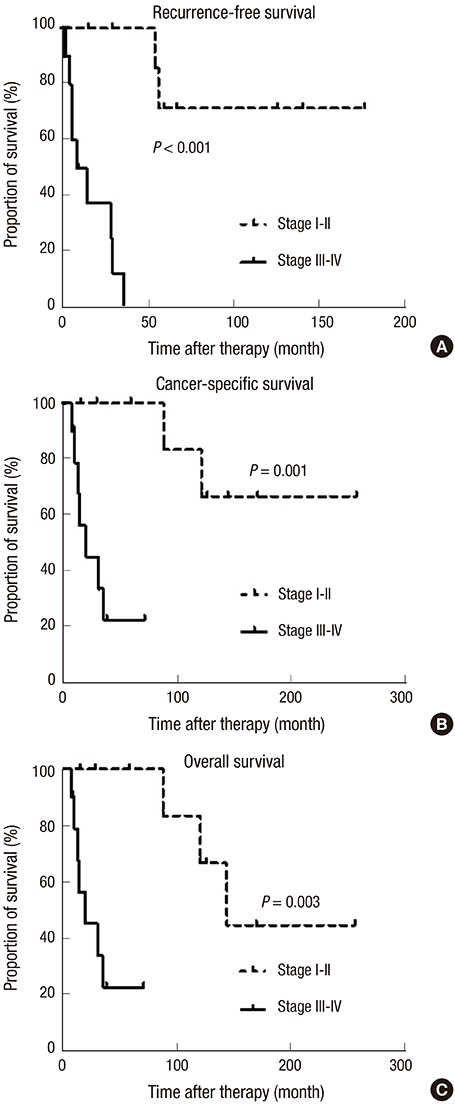J Korean Med Sci.
2015 Aug;30(8):1143-1149. 10.3346/jkms.2015.30.8.1143.
Survival Outcomes and Predictive Factors for Female Urethral Cancer: Long-term Experience with Korean Patients
- Affiliations
-
- 1Department of Urology, Seoul National University Bundang Hospital, Seongnam, Korea.
- 2Department of Urology, Seoul National University Hospital, Seoul, Korea. randyku@hanmail.net
- KMID: 2164510
- DOI: http://doi.org/10.3346/jkms.2015.30.8.1143
Abstract
- The aim of this study was to evaluate female urethral cancer (UCa) patients treated and followed-up during a time period spanning more than 20 yr at single institution in Korea. We reviewed medical records of 21 consecutive patients diagnosed with female UCa at our institution between 1991 and 2012. After exclusion of two patients due to undefined histology, we examined clinicopathological variables, as well as survival outcomes of 19 patients with female UCa. A Cox proportional hazards ratio model was used to identify significant predictors of prognosis according to variables. The median age at diagnosis was 59 yr, and the median follow-up duration was 87.0 months. The most common initial symptoms were voiding symptoms and blood spotting. The median tumor size was 3.4 cm, and 55% of patients had lesions involving the entire urethra. The most common histologic type was adenocarcinoma, and the second most common type was urothelial carcinoma. Fourteen patients underwent surgery, and 7 of these patients received adjuvant radiation or systemic chemotherapy. Eleven patients experienced tumor recurrence after primary therapy. Patients with high stage disease, advanced T stage (> or =T3), and positive lymph nodes had worse survival outcomes compared to their counterparts. Particularly, lymph node positivity and advanced T stage were significant predictive factors for all survival outcomes. Tumor location was the only significant predictor for recurrence-free survival. Although our study included a small number of patients, it conveys valuable information about this rare female urologic malignancy in a Korean population.
Keyword
MeSH Terms
Figure
Reference
-
1. Dalbagni G, Zhang ZF, Lacombe L, Herr HW. Female urethral carcinoma: an analysis of treatment outcome and a plea for a standardized management strategy. Br J Urol. 1998; 82:835–841.2. Derksen JW, Visser O, de la Rivière GB, Meuleman EJ, Heldeweg EA, Lagerveld BW. Primary urethral carcinoma in females: an epidemiologic study on demographical factors, histological types, tumour stage and survival. World J Urol. 2013; 31:147–153.3. Bracken RB, Johnson DE, Miller LS, Ayala AG, Gomez JJ, Rutledge F. Primary carcinoma of the female urethra. J Urol. 1976; 116:188–192.4. Gakis G, Witjes JA, Compérat E, Cowan NC, De Santis M, Lebret T, Ribal MJ, Sherif AM. European Association of Urology. EAU guidelines on primary urethral carcinoma. Eur Urol. 2013; 64:823–830.5. Dimarco DS, Dimarco CS, Zincke H, Webb MJ, Bass SE, Slezak JM, Lightner DJ. Surgical treatment for local control of female urethral carcinoma. Urol Oncol. 2004; 22:404–409.6. Edge SB, Compton CC. The American Joint Committee on Cancer: the 7th edition of the AJCC cancer staging manual and the future of TNM. Ann Surg Oncol. 2010; 17:1471–1474.7. Champ CE, Hegarty SE, Shen X, Mishra MV, Dicker AP, Trabulsi EJ, Lallas CD, Gomella LG, Hyslop T, Showalter TN. Prognostic factors and outcomes after definitive treatment of female urethral cancer: a population-based analysis. Urology. 2012; 80:374–381.8. Thyavihally YB, Wuntkal R, Bakshi G, Uppin S, Tongaonkar HB. Primary carcinoma of the female urethra: single center experience of 18 cases. Jpn J Clin Oncol. 2005; 35:84–87.9. Garden AS, Zagars GK, Delclos L. Primary carcinoma of the female urethra. Results of radiation therapy. Cancer. 1993; 71:3102–3108.10. Benson RC Jr, Tunca JC, Buchler DA, Uehling DT. Primary carcinoma of the female urethra. Gynecol Oncol. 1982; 14:313–318.11. Visser O, Adolfsson J, Rossi S, Verne J, Gatta G, Maffezzini M, Franks KN. RARECARE working group. Incidence and survival of rare urogenital cancers in Europe. Eur J Cancer. 2012; 48:456–464.12. Kato H, Kobayashi S, Islam AM, Nishizawa O. Female para-urethral adenocarcinoma: histological and immunohistochemical study. Int J Urol. 2005; 12:117–119.13. Ouzaid I, Hermieu JF, Dominique S, Fernandez P, Choudat L, Ravery V. Management of adenocarcinoma of the female urethra: case report and brief review. Can J Urol. 2010; 17:5404–5407.14. Meis JM, Ayala AG, Johnson DE. Adenocarcinoma of the urethra in women. A clinicopathologic study. Cancer. 1987; 60:1038–1052.15. Grigsby PW, Corn BW. Localized urethral tumors in women: indications for conservative versus exenterative therapies. J Urol. 1992; 147:1516–1520.16. Gheiler EL, Tefilli MV, Tiguert R, de Oliveira JG, Pontes JE, Wood DP Jr. Management of primary urethral cancer. Urology. 1998; 52:487–493.
- Full Text Links
- Actions
-
Cited
- CITED
-
- Close
- Share
- Similar articles
-
- Long-term follow-up study and long-term care of childhood cancer survivors
- Analysis of Long-Term Survivors after Resection for Hilar Bile Duct Cancer
- Prognostic Factors and Survival Rate of Pancreatic Adenocarcinoma after Curative Surgery
- Scoring of prognostic factors that influence long-term survival in patients with hepatic metastasis of colorectal cancer
- Long-Term Outcome of Primary Endoscopic Realignment for Bulbous Urethral Injuries: Risk Factors of Urethral Stricture





